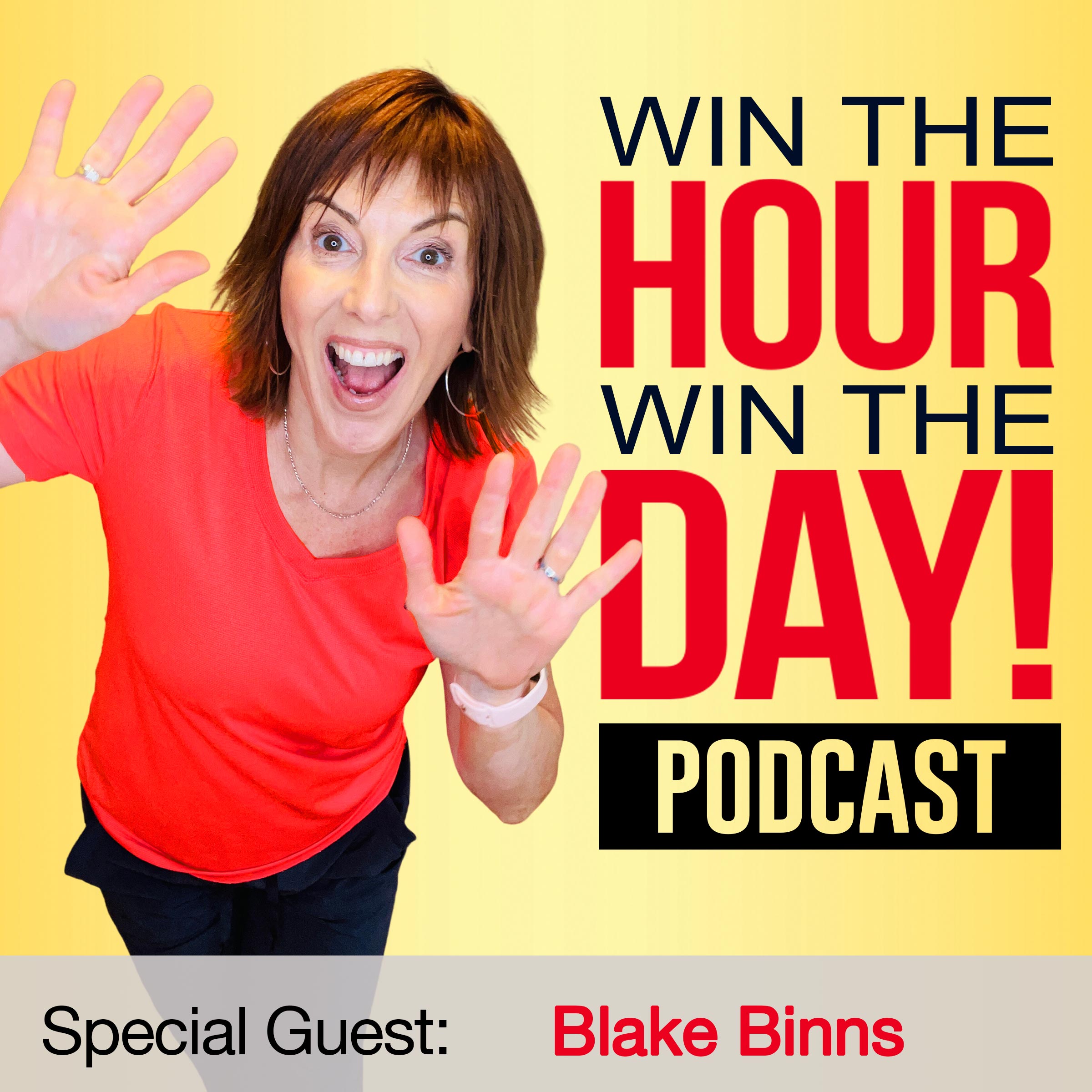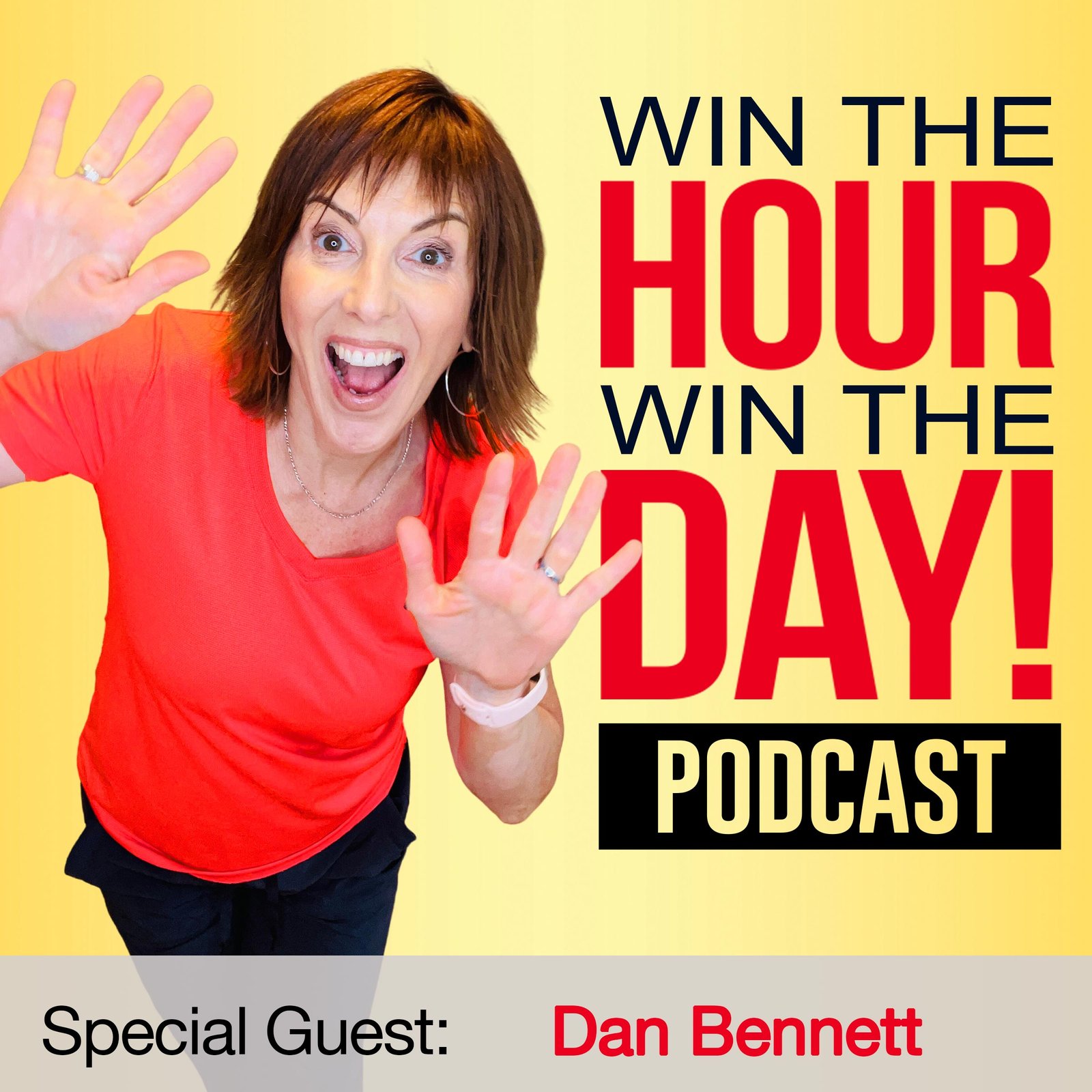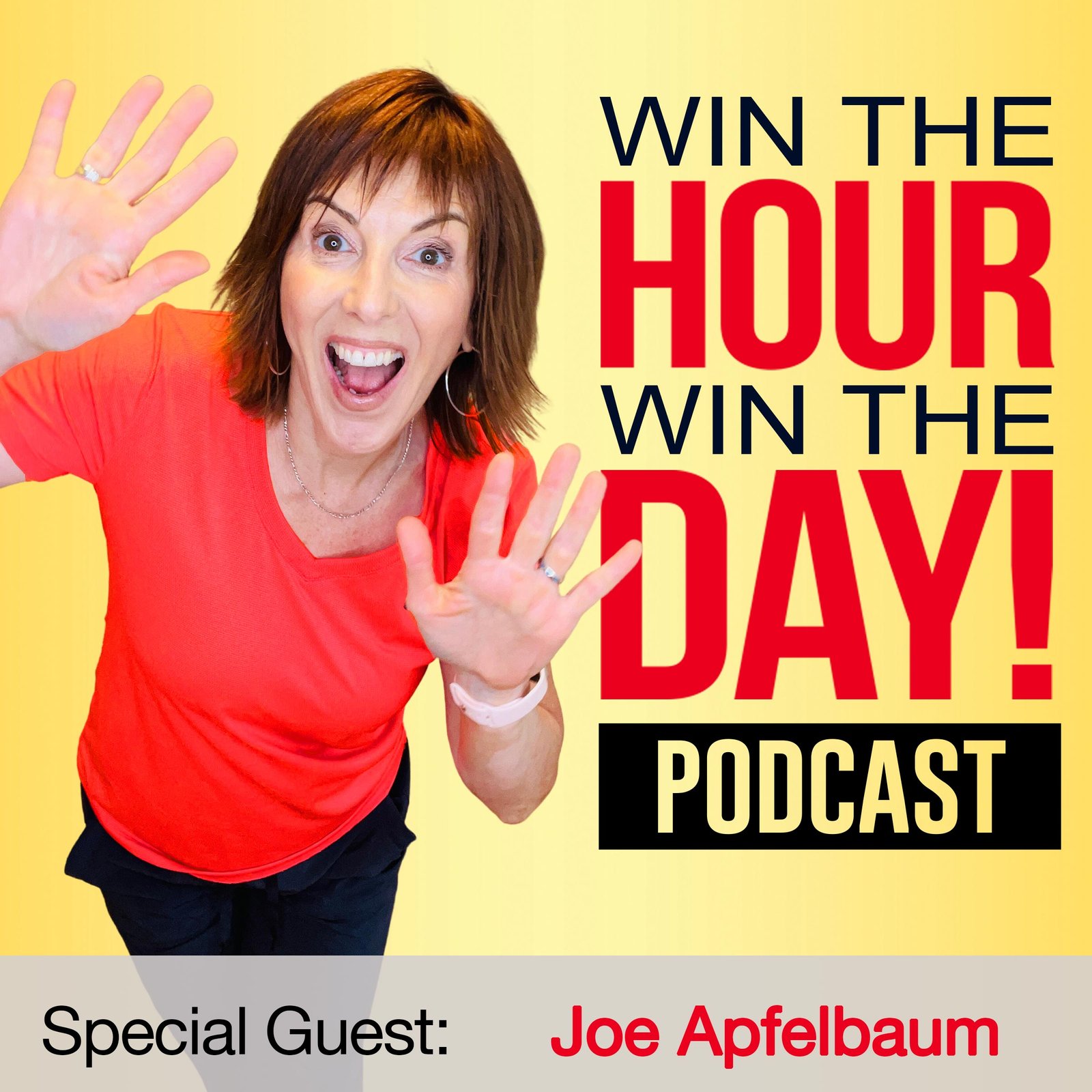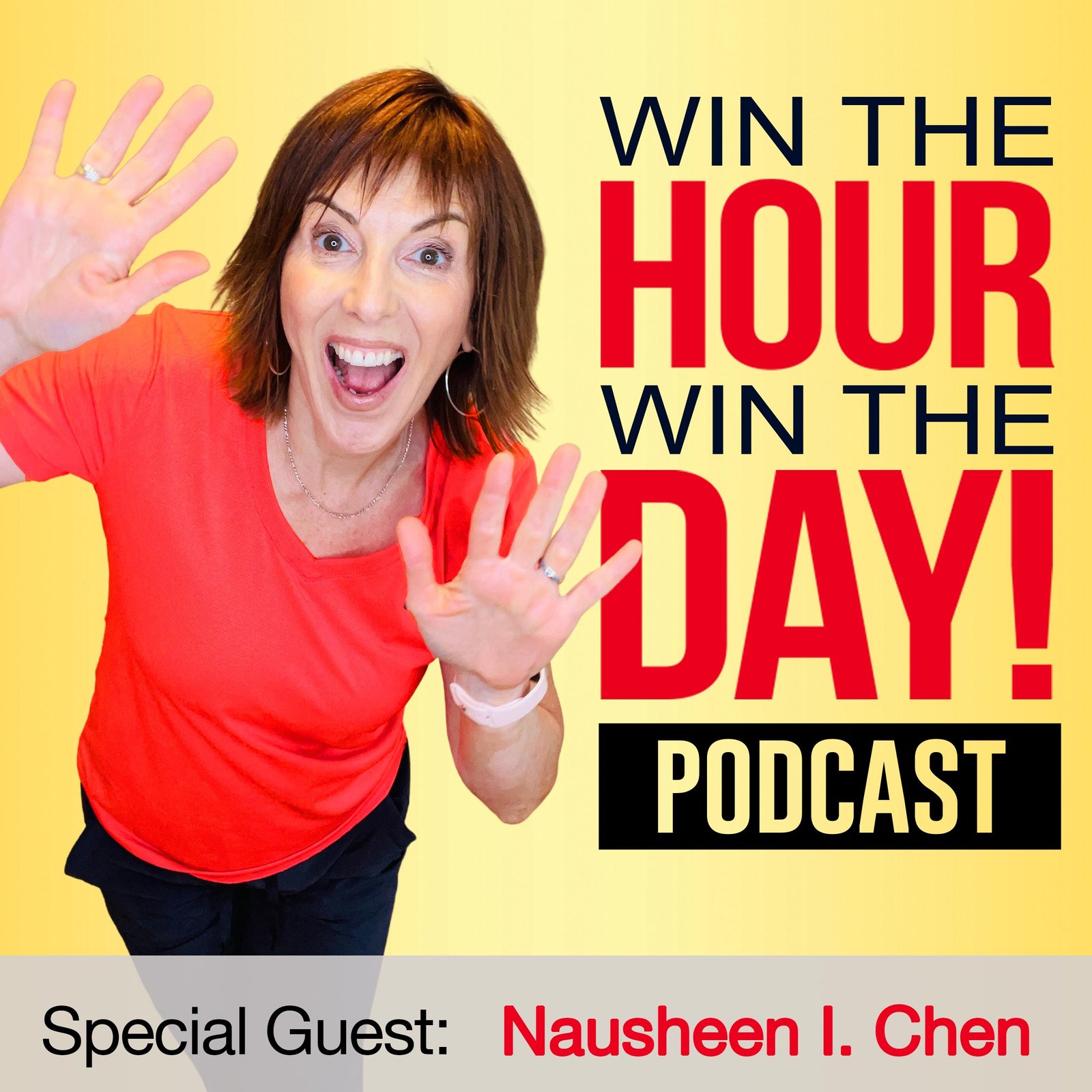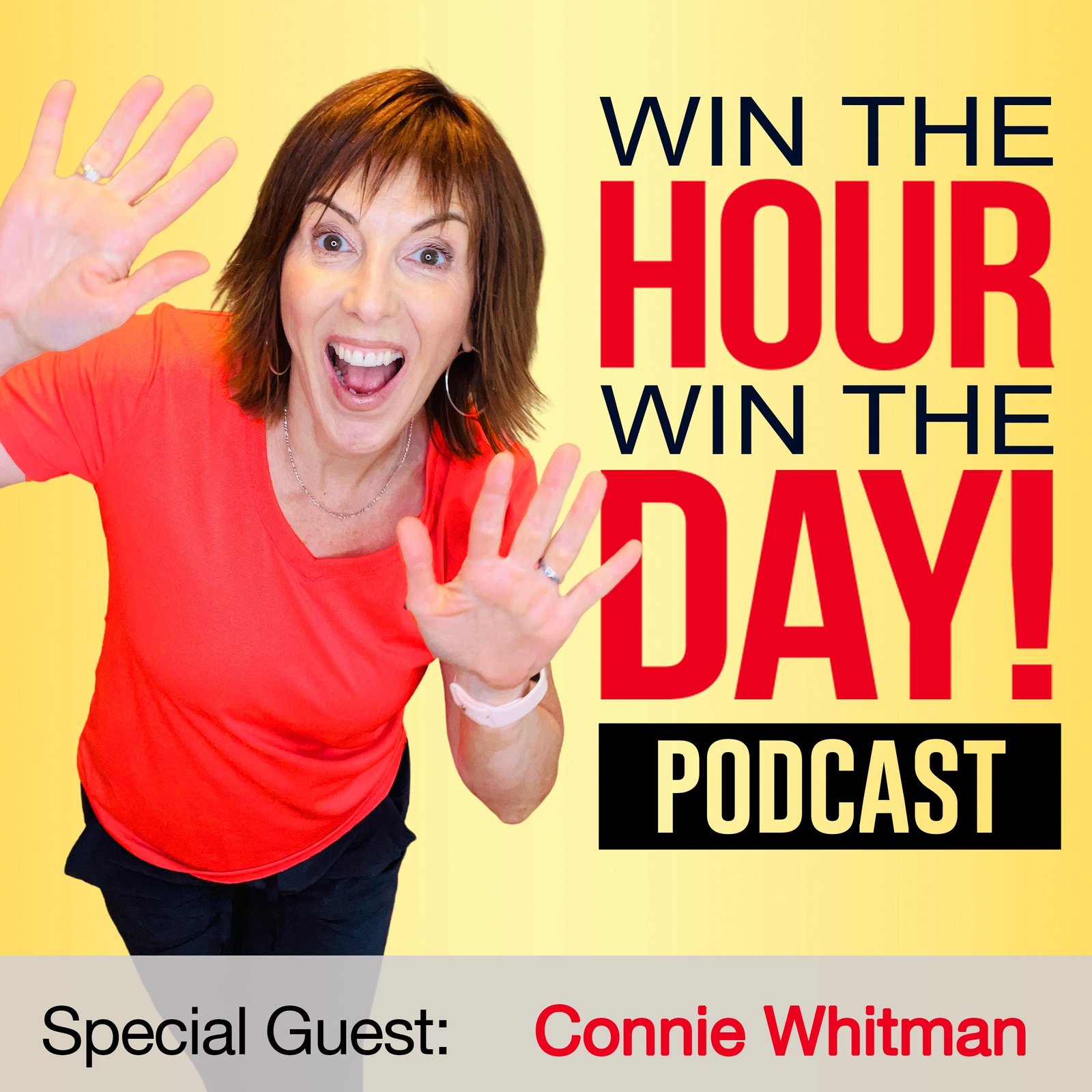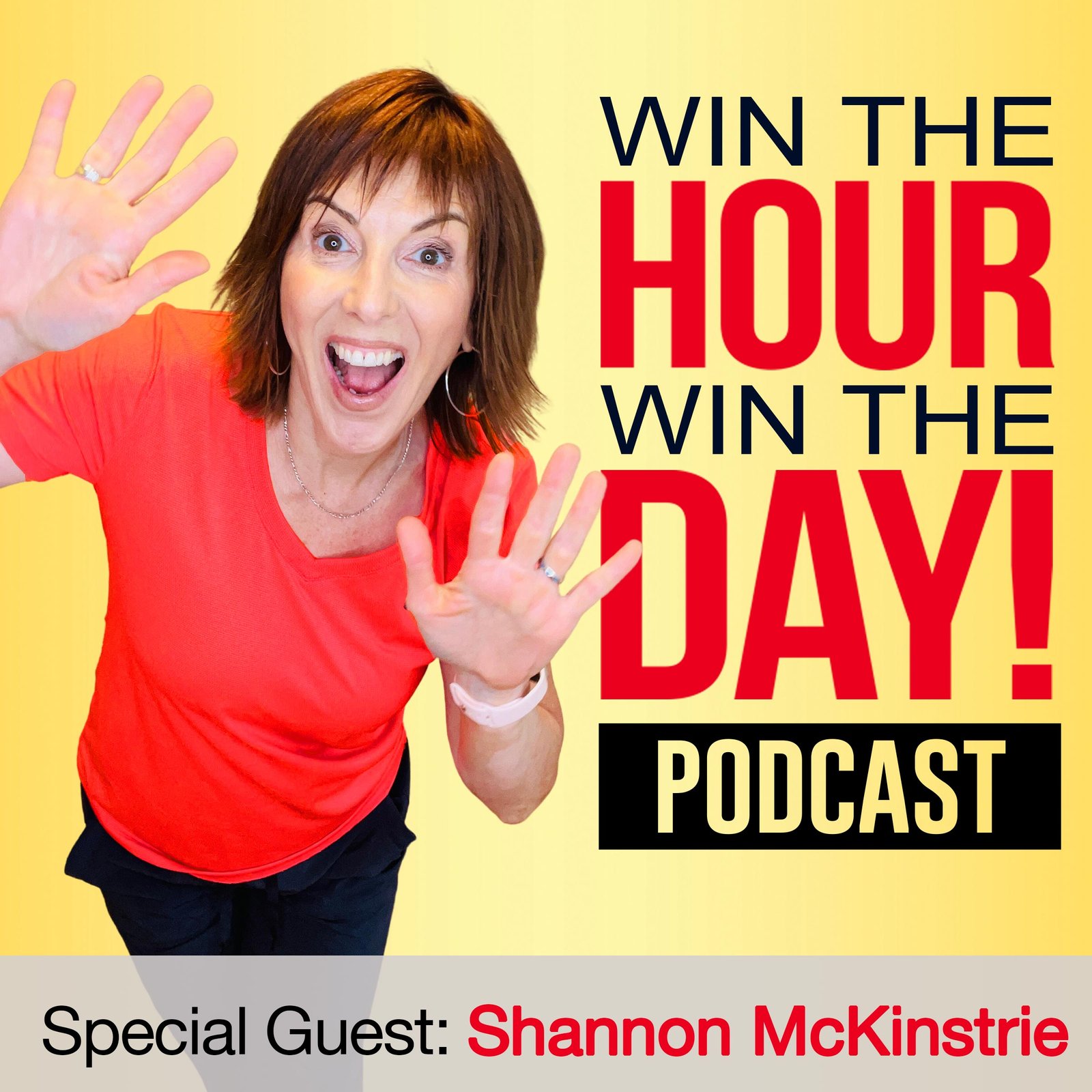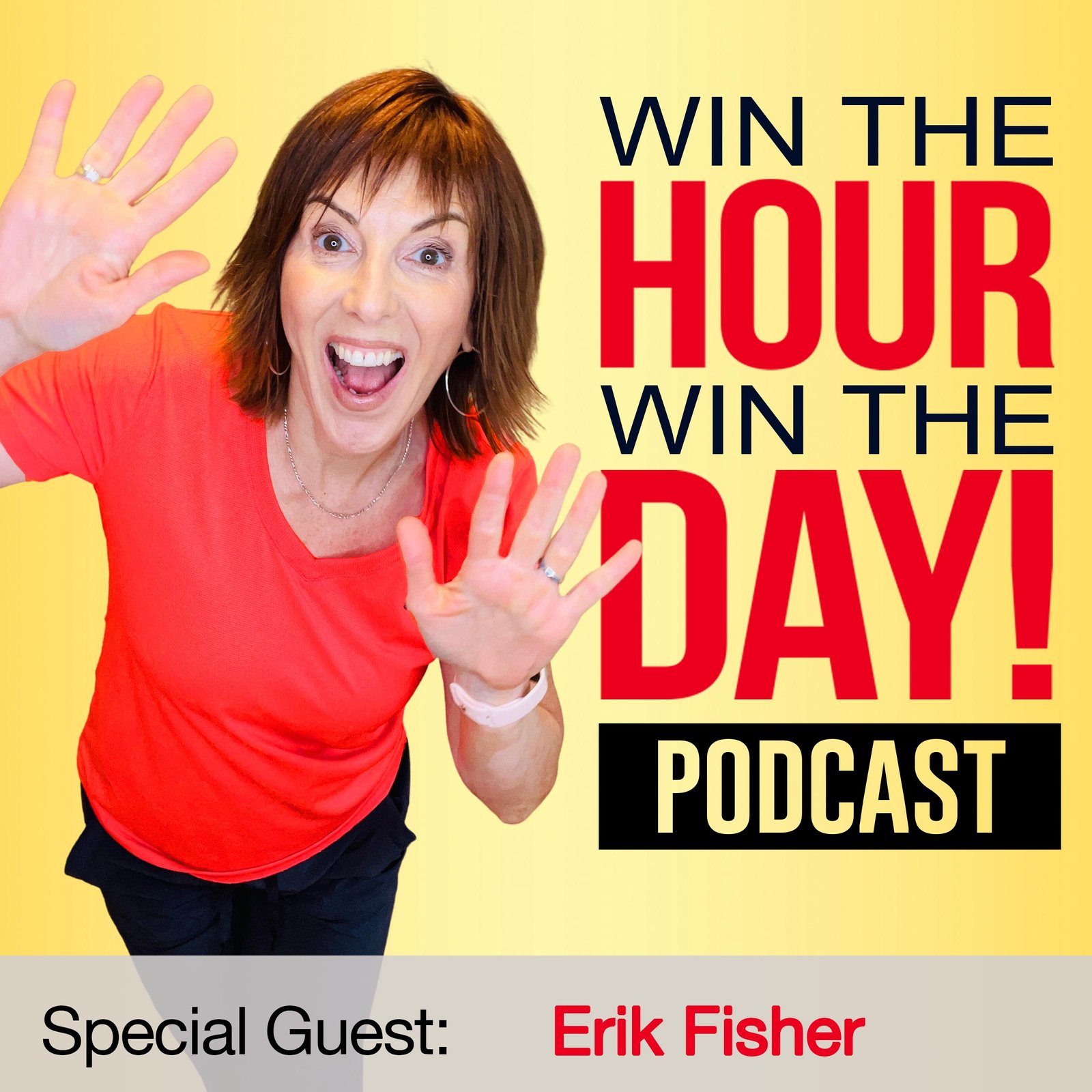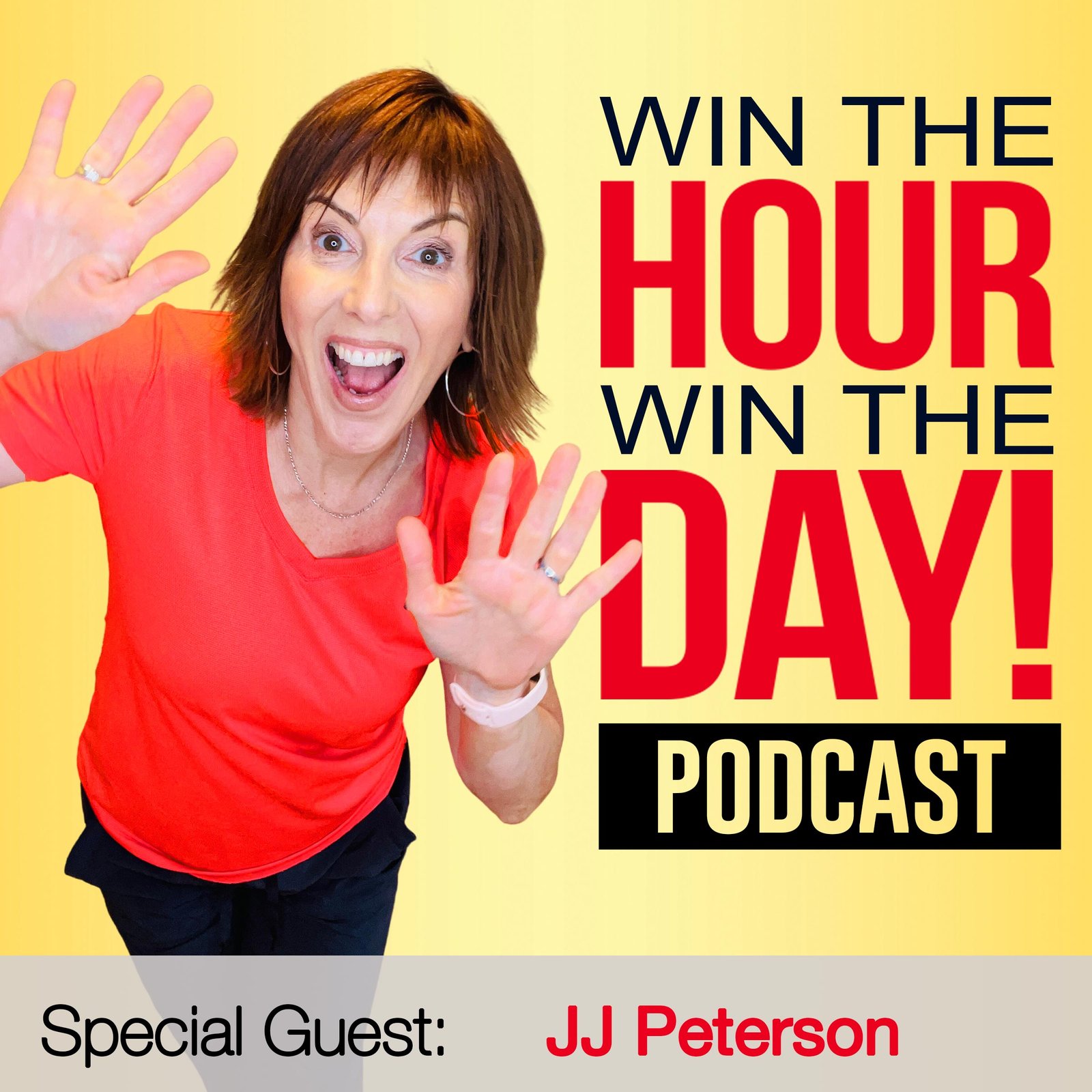Episode Summary This week’s episode of Win The Hour, Win The Day Podcast is...

Are You Ready For Your Next Big Win?
Know your entrepreneur personality and I’ll take it from there!
Recent Podcast Episodes
Preventing Burnout with Smart Work Tools! with Kris Ward
Episode Summary This week’s episode of Win The Hour, Win The Day Podcast is...
Master Social Selling: Heidi Medina’s Strategies for Engagement
Episode Summary This week’s episode of Win The Hour, Win The Day Podcast is...
Boost Productivity and Master Storytelling! with AmondaRose Igoe
Episode Summary This week’s episode of Win The Hour, Win The Day Podcast is...
Master Video Marketing: Top Tips for Entrepreneurs with Dan Bennett
Episode Summary This week’s episode of Win The Hour, Win The Day Podcast is...
Boost Your LinkedIn Strategy with AI Tools for Enhanced Productivity! with Joe Apfelbaum
Episode Summary This week’s episode of Win The Hour, Win The Day Podcast is...
Mastering Personal Branding with NLP Techniques! with Olesija Saue
Episode Summary This week’s episode of Win The Hour, Win The Day Podcast is...
Innovative Lead Generation and Email Automation Secrets with Jennie Wright
Episode Summary This week’s episode of Win The Hour, Win The Day Podcast is...
PR Strategies for Diverse Entrepreneurial Impact! with Jennifer Singh
Episode Summary This week’s episode of Win The Hour, Win The Day Podcast is...
Convert More Clients on LinkedIn with Richard Moore
Episode Summary This week’s episode of Win The Hour, Win The Day Podcast is...
Master Business Growth on Pinterest with Meagan Williamson
Episode Summary This week’s episode of Win The Hour, Win The Day Podcast is...
24/7 Sales Boost: Video Marketing Secrets with Alex Sheridan
Episode Summary This week’s episode of Win The Hour, Win The Day Podcast is...
Master Public Speaking Tips with Nausheen Chen!
Episode Summary This week’s episode of Win The Hour, Win The Day Podcast is...
Beating The Burnout With Connie Whitman’s Success Story
Episode Summary This week’s episode of Win The Hour, Win The Day Podcast interviews,...
Craft Your Social Media Content Strategy With Shannon McKinstrie
Episode Summary This week’s episode of Win The Hour, Win The Day Podcast is...
Boost Your Productivity with AI Tools: A Deep Dive with Erik Fisher
Episode Summary This week’s episode of Win The Hour, Win The Day Podcast is...
Boost Visibility: Repurpose Content and Leverage Podcasts With Christina Lenkowski
Episode Summary This week’s episode of Win The Hour, Win The Day Podcast is...
Master Personal Branding & Storytelling with Lisa McGuire
Episode Summary This week’s episode of Win The Hour, Win The Day Podcast is...
Boost Business on LinkedIn with Catherine B. Roy’s Strategies
Episode Summary This week’s episode of Win The Hour, Win The Day Podcast is...
Scale Your Business: Optimizing Virtual Assistant Services with Kris Ward & Rachel Eubanks
Episode Summary This week’s episode of Win The Hour, Win The Day Podcast is...
Affordable PR Mastery: Crystal Richard Unveils Modern Techniques
Episode Summary This week’s episode of Win The Hour, Win The Day Podcast is...
Mastering Business Storytelling with JJ Peterson’s Guide
Episode Summary This week’s episode of Win The Hour, Win The Day Podcast is...
Revamp Your About Page: Guide to Personal Branding
Episode Summary This week’s episode of Win The Hour, Win The Day Podcast is...
LinkedIn Mastery and Video Marketing Secrets with Alex Sheridan
Episode Summary This week’s episode of Win The Hour, Win The Day Podcast interviews,...
The Systems and Processes Playbook: Insider Secrets to Streamlining Your Small Business with Leah Abunales
Episode Summary This week’s episode of Win The Hour, Win The Day Podcast interviews,...
Create Content For A Whole New Purpose! with Martin Huntbach
Episode Summary
Martin Huntbach gives us a whole new view on content creation. This is a different approach than everything out there. Listen and learn where we’ve all been totally missing big opportunities.
Learn
-why SEO rich content is not the answer to everything
-how to protect your resources with a Content Fortress
-the biggest content mistakes you are making and how to easily fix them.
You can find Martin Huntbach at:
Website: https://jammydigital.com/
Email: https://jammydigital.com/contact/
LinkedIn: https://www.linkedin.com/in/martin-huntbach/
Facebook: https://www.facebook.com/JammyDigital/
YouTube: https://www.youtube.com/channel/UCOCyzgVyV8C2m-Z9bi6Dpyw
Win The Hour Win The Day
https://winthehourwintheday.com
Martin Huntbach Podcast Transcription
START[00:05:28]Kris Ward: Hey, everyone. Welcome to another episode of Win The Hour, Win The Day Podcast. I am your host, Kris Ward, and today in the house, we have Martin Huntbach. Martin is a content strategist, and he is going to change the game for us today. Welcome to the show Martin.
[00:05:45]Martin Huntbach: Thanks so much. I’m really excited.
[00:05:47]Kris Ward: Okay. Martin, we’re all about big results. No fluff here. So let’s dive into it because you know what, as I said to you, when we met, I’m like, okay, let’s talk about repurposing content Martin and all this other stuff, but we’ve heard it before. What are you going to bring differently to the game? So you talked to us about building a fortress, a content fortress.
So I might be fumbling that. So why don’t we just start with it? What do you mean by that? And why do we need it?
[00:06:013]Martin Huntbach: The really interesting thing is that content marketing and content design, and everyone’s talking about content and have been for a while. And sometimes we get caught up in these kinds of buzzwords and I think content marketing is definitely one of those words.
[00:06:28] And we use content marketing to grow our business and we produce loads of content and it delivers loads of traffic as the flight doc. And it works, you know, it delivers more traffic and more leads and more sales. It does work. However, with the concept of content fortress is slightly different. So content market is about leads and sales and about creating content and attracting your audience, which is great, but you don’t really have the opportunity to decide the kind of clients you want to work with.
[00:06:57] You know, and if you can use content to drive more leads and sales, could you use it to try and attract a particular type of person? You know, we all speak about buyer personas and things like that. And who’s your ideal customer, but actually there’s no one out there really talking about combining those two things, it’s all about what help, help, help.
[00:07:17] And then hopefully you’ll get customers on the backend. And we actually got to a point within our agency where we were working with loads of people because our content was delivering leads and sales, but most of the people that were coming to us, weren’t our ideal customers. Maybe they didn’t have the budget.
[00:07:31] Maybe they didn’t have the right mentality. Spending an awful lot of time, weeding out the right kind of clients from the wrong kind of clients. So eventually we started to produce content that allowed us to protect ourselves. And that’s why the idea of a content fortress comes in, you know, create content to get leads and sales.
[00:07:48] That’s one thing. But actually, if you could create content that decides that when someone lands on your website, they consume some of your content. They’re able to kind of like self identify if you’re the kind of business for them. And…
[00:08:01]Kris Ward: Let me jump in there just for a second. So in our case, we help entrepreneurs stop working so hard.
And we do that through team, time and super toolkits. We don’t work with brand new businesses for a number of reasons. So if I’m saying, all right, I need to be attracting the right type of client. Is that where we write articles or do blogs or posts about the people we don’t want to work with? Like, where do… how do we divide that?
[00:08:26]Martin Huntbach: Yeah. So there’s a few ways to do it. We call it repelling content and that’s one of the eight pillars within the content fortress and repelling content is the kind of content that says, if you are not this, then we’re probably not right for you. So the exact example that you asked about is the exact piece of content we personally have created that says.
[00:08:48] Like why new businesses? When we were building websites for clients, we actually had that same problem. We had a lot of new business owners coming to us and it wasn’t the right time because our prices were quite high in comparison to what they were expecting. There’s a lot of risk involved and we just decided categorically.
[00:09:03] We didn’t want to work with brand new business owners. So we published a piece of content that literally said one new business owner shouldn’t pay thousands for a brand new website and we’d send it to anyone that got into it. Within the, like a copy and paste and say, oh, thanks so much for getting in touch.
[00:09:17] It sounds like a great venture. Here’s a piece of content that explains why we don’t think of you as a brand new business owner should hire an agency like us because there’s a lot of risk involved. You know, the business can change quite a lot. So that’s one way that you can do it. You can make it.
[00:09:32]Kris Ward: So let me unpack that if I can. Okay. So first of all.. comes to mind a couple of questions. One is if they’re just reaching out to you, how do you know? Maybe that’s your pre-qualifying stage. So you’re sending them an article about why you don’t work with new business essentially. But how did you know that? Like through the email, did you ask them that like, oh, tell us a little bit about you and then you respond with that article.
[00:09:54]Martin Huntbach: Yeah. So one of the common. I suppose the questions that people ask they get in touch sometimes and they send an email and they say, we absolutely love your brand, your content is really helpful. It’s really, really amazing. And we’d love to work with you. And then they actually divulge, you know, some of that information.
[00:10:09] So like I’m just starting a brand new business. And I’m wondering if it’s, you know, what package should it go forward? What should we do? How can we work together? And then, then that’s when we say, you know, we’d love to have a call with you but might want to check out this article, first of all. So actually when people around they’re requesting calls from service providers far too often, service providers are so excited about getting on a call with someone and having access to talking to them and potentially selling them that they jump on a call before they actually pre-qualifying.
[00:10:40] So we actually take a step back and say, it’s great that you want to chat with us. Here’s what I want you to do. First of all, I’m going to send you a couple of links to a couple of articles. One of them is our pricing structure and how that works and another one might be, but it all depends on what they say in their emails.
[00:10:58] We might have someone say I’m a brand new business. We might have other people saying, for instance, this is why the content fortress is so important because every customer that gets in touch is so different. So if somebody gets in touch and says, “Hi, I have a budget of a hundred pounds, and I want to work with you.”
You know, you need a piece of content to protect your business from that. You don’t want to get into a debate about why then…
[00:11:21]Kris Ward: Okay, hold on. So I think I’m getting it, so the fortress is really to protect your time. Right. Okay. Okay. So in my case, I don’t know what the answer would be. Do I think somebody could use my services right from the beginning probably.
[00:11:35] But what we work best with is first of all, when you’re a new business, you have this idea. And I know I did, once I get past this next thing, and once they get paid, once they get the website up, once they get, and all of these things that, you know, you have to get in play. And then you think everything will fall in and if it’s going to be golden and that doesn’t happen because you don’t have the infrastructure going from one client to two to five, you think, well, once I get caught up, right, well, now I’ve lost some business.
[00:12:00] Now I’ve got to bring out more business and you’re just chasing your tail. So I tend to work with people who’ve been in business at least five years, usually 10, because they now realize. That this, once they get past this, once they get past, this is not going anywhere and they’ve been in business 10 years, that they are obviously, they’re the common denominator.
[00:12:15] There’s a bigger problem. And that’s the lack of infrastructure and the things that they don’t set up properly. Right. So I don’t know how I would put that in a blog pretty much, because you can say. Yeah, it’s just, you’re not going to get me you’re new in business. I guess I could write it, something like that.
[00:12:33]Martin Huntbach: We’ve written an article before that says seven reasons you shouldn’t work with us and you’d essentially just list those things. You know, you’re not staging your business. One of our coaching clients has just literally sent us an article that she’s written. She’s a Facebook ads expert.
[00:12:47] And she just decided to put all of the reasons that you shouldn’t work with her into an article. You know, you could do this in video. It’s not just content, you know, you could do it in a TikTok if you wanted to, you could do it on a podcast. You know, if you just simply just got a pen and paper and wrote down the main 6, 7, 10 reasons that somebody might not be your ideal customer and then send it to people, sometimes people say to you, I’m not sure if it’s the right time for me yet.
[00:13:13] What do you think? You know, we’ve all had those conversations with clients. Oh, you now have a piece of content, some intellectual property out there online that you can literally send to people to say, here you go. Make the decision for yourself.
[00:13:28]Kris Ward: Okay. I know we’re at step one and I keep stopping you because I’m intrigued and I’m all these questions and this is what we do.
[00:13:31] But I think what I’m seeing is this protects you, which I don’t liberally give away time on my calendar, but this protects you from getting seduced and excited about, oh yes, this is a prospect. So it protects you from wasting your time on that. And then when we’re all about efficiency here, Win The Hour Win The Day, then you have this content that has been well thought out, whether it’s a video.
[00:13:53] Whether it’s written and you can say, look, then I’m not sitting there after you wasted my time in the calendar, trying to explain this to you. So it’s.. you’re right, the fortress to protect you, your time and your business. Okay. I’m getting it. Look, I catch on. All right. Let’s move forward. Okay. So number one is repel. What else do we do?
[00:14:10]Martin Huntbach: Yeah. So, I mean, probably won’t have time to go through them all, but I’ll give you the sort of pillars. So repelling content is one of them. There’s also another side which is attracting content. So you can create content that allows you to attract people who may never have thought about hiring you in the first place who, you know, deep down that you really, really want to work with.
[00:14:31] So we see this quite a lot when people go from working with one-to-one clients and then they maybe want to transition into corporate clients, you know, you can use content and create content in order to make that happen just by creating content about why we don’t just do this. And what other services do we offer?
[00:14:47] One of the problems I see with content is that people are constantly distracted trying to drive traffic. They just can’t create in-helpful content, but actually we found the best performing content is content that helps you communicate what you do and who you serve in a way that you can control.
[00:15:05] So if you want to create content, if you want to start working with a particular segment, then you could create content. And so did you know, we actually serve these people as well. You can create case studies about those people. So attracting content is equally as important, especially because, it does work. You’ve also got…
[00:15:23]Kris Ward: Okay. So let me pause there for a second. Cause I think what you’re doing is… this is pretty deep stuff, I’m really liking it. We tend to, uh, I do anyhow, you get into this formula situation where you’re like, okay, I got to write content. So here’s why you need infrastructure. Here’s why you need systems/processes.
[00:15:39] Here’s why you need your Super Toolkit. And you think once you get caught up, once you get caught up or whatever, blah, blah, blah. So I’m leaning into the problem more than I’d like to, right, or I can talk about.. listen, why you need to start your WIN Team. And it’s very different than a VA, but I’m still leaning into the problem where if I could be talking about
[00:15:56] the type of clients we were, I could write a little story. We work with businesses who have been in my business these five plus years tend to be service-based and they do, you guys do really well, but now you want to move on to that next level. You want to go from one to many. And how do you do that when you’re trapped in your own business and then do little case study.
[00:16:12] So it’s almost like we’ve been so pushed to, you know, what’s the problem you solve, but now we can tell stories. And make our clients the characters in that, and that would be valuable content for attraction.
[00:16:26]Martin Huntbach: Yeah, exactly. One of the examples we used in the book, Content Fortress was again, one of our students, one of our coaching clients says, a martial arts school here in the UK. Now,
[00:16:38] everyone would assume that anyone who wants to join a martial arts school want to join a martial arts school. Cause they want to be like the people in UFC or they want to be, you know, win the belts, but actually there’s martial arts school, Aiden and Yasmin, they realize that a lot of people that were signing up to be part of their school were people that were being bullied and the girls as well.
[00:16:59] They started to talk about bullying a lot more when none of the other martial arts schools in that town, or even probably this country are talking about bullying, how to deal with bullying in a way that doesn’t involve violence. Now for a martial arts school to say we will help you solve your personal problems without violence.
[00:17:19] It’s so far away from what kind of content you think the martial arts school would create that they’re naturally going to attract more people that want to solve those problems using their head versus the hands. So they use content and case studies in order to make that happen. And then all of that content becomes family friendly rather than here’s how to throw the perfect kick or whatever.
Like a lot of martial arts school might do. And so that’s solving that problem by thinking smart.
[00:17:47]Kris Ward: Yeah, I know that’s okay. So the stuff is there again, so now it’s making me realize, you know, that I could be talking to them in a different vein cause I do. I feel I get trapped in the presenting instead of talking to, and the blasting of here’s the problem and, you know, whatever.
[00:18:05] But if we can come at it from a softer storytelling, different angle, It’s just a whole more refreshing look. And then also what’s out there and say like sales, blah, blah. Let me tell you, we solve your problems. Right? Okay. Profound stuff here. It’s very subtle but profound. Okay. Continue my wise friend.
[00:18:24]Martin Huntbach: Yeah. So then we have the next two kind of linked; pricing content and sales content. So one of the things, like I said, that people focus on is creating really helpful content, but at some point people genuinely do care about what services you offer and how much you charge. So you can create pricing content.
[00:18:43] What we do is we create a pricing content about all of our services. We never have a service on our website that we don’t have a price for. This scares people because the light, well, it’s bespoke. We’re like, no, like there are people out there that want to know how much you charge for particular services. So therefore we advise people to create content about it.
[00:19:02] You know, if, for instance, for us in the past, we’ve built websites. So we created content how much does it cost for a website? And you actually talk about that openly, not just for you, but how much they might expect to pay, how much it might cost for interior decorator if that’s what you do, how much?
[00:19:19]Kris Ward: Okay. Okay. Let me jump in here again. Cause this is why stuff. So when you’re first talking, I was like, okay. My pushback is many years ago. I read this book and like the first thing you want to do to drive down businesses, put your pricing up online. Right? Because it can’t sell itself and they don’t understand what’s involved in anything like the value of it.
[00:19:36] Like whatever. How many times did we go to get a price on something like, oh, I thought this would be.. well right now I’m getting some work done in my basement. And then we had to go over for a second thing of lumber. And I said to my uncle, hello, they say money doesn’t grow on trees. Neither does wood because this is expensive.
[00:19:52] Right. So I hope I didn’t get that wood and dirt is really expensive, but anyhow, so I think what you’re saying is in my case, a lot of my clients have come to me and they have in the past. Now it’s a new thing. You can go to an agency to get a VA. And the problem with that is they can give you, it’s almost like giving somebody a chef.
[00:20:11] Like I could send a highly trained chef to your house and they may be really skilled. But if you’ve got kids that only want chicken nuggets, it doesn’t matter how good that chef is, it’s the wrong place. So my thing is, well, that’s great. They send you a VA. You’ve locked into this two month contract. It’s very expensive.
[00:20:27] And because you don’t know how to hire and onboard yourself, they do that for you. Very pricey. You’re locked into it, but the systems aren’t set up there. So it’s not going to last and it never does. And then you get burnt out and think, well, I can’t even do a VA. So I deal with a lot of the fallout in that.
[00:20:39] So I could write an article on the costs of hiring from an agency without even if I didn’t want to address working with me because there’s different entry points of working with me. So I can talk about that cost if I don’t want to talk about my own costs.
[00:20:55]Martin Huntbach: Yeah. You can talk about any cost related topic that you want to that’s relevant to your audience.
[00:21:00] To mention that there are countless examples of, you know… one of our close friends, they build sheds and God and houses, and she uses timber and she’s always talking about price, but the reality is, and this is the one thing that I think really makes people realize that you should be talking about price on your website, which is if I was on a call with you, I don’t care if you’re an accountant, a financial advisor, an interior decorator really doesn’t matter. If I was on a half an hour call.
[00:21:27] And I said to you. What are all of the things that make the price go higher versus lower? Like if you know, within your service, within your package, within your industry. How much would it cost? And sometimes people say, well, I need to know more about your business, and I need to know more about this and what we need to deliver, but you can generally always give people a guide price.
[00:21:47] You don’t have to say, this is the exact price you can say. Usually people, you can say from 3000 pounds for my coaching program, you can say people usually spend between three and 5,000 pounds. You can also say an average cost is 4,000 pounds, but it really depends on what you want. So it’s about giving people an indication so that people can self serve.
[00:22:08] Because the last thing you want is somebody that’s only got a thousand pound project and in touch with you. So there’s so many different ways around the pricing debate that will protect you as long as you’re producing some content and he’s giving to people indications, it really, really will save you a lot of time and we can pretty much guarantee
[00:22:27] every single sales call, we go on, they’ve seen our prices. We’ve made them see our prices before we book on a sales call or an indication of them. And we pretty much know that 90% of the proposals we’re going to send, they’re going to go to business because we have this infrastructure in place. You know, we don’t speak to them unless they’ve seen our prices.
[00:22:44] We don’t speak to them unless they’ve consumed some of our content. It just means that we speak to fewer and fewer people, but we’ve been able to work with better clients, charge more. Get better relationships in which you’re not chasing for sales anymore. We never have to worry about where the next sale is coming from because we have the structure in place.
[00:23:01] Now, the mistake that a lot of people make is they say they have a very thin website. They don’t have much content about the process and about the price and about the service itself. And they just say, getting touch to find out more. And then you’re in this, this sinus cycle of just call after call on the call in the hopes that someone’s going to sign up. And it’s just the way that we used to do it. And that’s why we have to fix it.
[00:23:24]Kris Ward: Yeah. And again, you’re giving me, I’m just making notes. I don’t know if you guys can hear this, but I’m making notes because we do. I don’t know if it’s just me, but you get stuck on, you see this one thing and then you sort of redo it, repurpose it.
[00:23:37] And you hear a lot about repurposing content, but even like, yeah, I can write an article about the process. Like, you know, when you start working with us, this is what we do. And we do this discovery part. And then we figure out where, you know, all the places that water is bleeding out of the boat or leaking out of the boat and, you know, the finding that your VA for you, but then helping you to hire, train and onboard them and do all this stuff.
[00:23:59] So there is a magical journey that people always ask me, well, how do you do it? And I yet to have to write anything about that, cause I’m always writing about. You know, this stuff we’re listening, when you’re working eight o’clock at nine o’clock at night, you think, well, once they get past this thing, you’ll be fine.
[00:24:13] You won’t, you’ll be doing that this time next year, but that’s still, still problem. Problem, problem. It’s boring to talk about. And it’…, I feel boring to listen to you. Like, then I’m just this person blasting you all the time.
[00:24:25]Martin Huntbach: Well, yeah, you have to think to yourself if we really, really, really thought about, rather than the algorithms and constantly producing content that we think people are going to like in terms of traffic and leads.
[00:24:37] If we actually thought about the deep rooted things that people need before they make a buying decision, you would entirely rethink your content strategy. You would think, okay, what are all of the questions that anybody’s asked me on my website? You know, when they’ve got into it with me, a good friend of mine, Marcus Sheridan.
You actually wrote the foreword for our book. He’s got a book called They Ask, You Answer. And he did this.
[00:25:00]Kris Ward: Yes. I love that book. Yes, yes, yes. Okay. That didn’t change my, sorry. I jumped in there. That was one of those books where I read it on a Sunday and I was waiting for my team to come up. Okay.
[00:25:09] Everybody on Monday. Listen, doing right. Okay. Hold on now, I had a powerful thought, I think we get also trained by this whole asking the answer and everything is like, well, people are searching for that problem in Google. We keep hearing that over and over again. So you want to be the answer to that question, like how to avoid burnout.
[00:25:31] Okay. Well, it’s not about you being in my case, a lot of people think they need to be more disciplined, more organized. That’s not it because you just reorganize yourself that doesn’t change the infrastructure. Right? So, then people say, oh, I’m not organized. You won’t be able to work with me. No, you’re going to be easier than the organized person.
[00:25:47] But I’ve been so trained that when somebody stands at the desk keying and how to avoid burnout, I have to be the answer to that. But then your other things you’re listing here is like, you know, our process and all that stuff is far more interesting. But am I going to be the answer to their question when they were doing that search? I guess if I laid in it with the correct keyword.
[00:26:05]Martin Huntbach: I think that’s the important thing to remember. Now we love SEO. What we do is we drive traffic through content. However, on this particular occasion, what I’m saying is if you want to really, really educate your buyers, forget about the algorithms. Forget about SEO for a second.
[00:26:22] If you could, every single piece of content for everyone, every question. Prospect has asked you like, okay, so what happens after I hand over my cash? What’s the next step? What do we do to go live? What do we do to make this a success? What could we do? So it’s about managing the process, the sales process through your content as well. So as an example…
[00:26:45]Kris Ward: Okay, hold on. Hold on. That’s really deep. I want to hear your example, but what you’re saying is, listen, you’re walking. You’re just stopping. When you get to one door, walk through that door. We’ve got other things to talk about. That is not even the beginning of the journey. It’s the sales journey.
[00:27:00] So we all got stuck on that SEO be the problem and the solution. And that’s it. We’re like a one to I, or we I’m a one trick pony. And I’m just singing the same song, but you’re right. Then there is more to that. There’s that whole sales journey. Oh, very deep stuff here. Okay. Excellent. I got it. My apologies, your example.
[00:27:19]Martin Huntbach: Yeah. So the example, not that that scenario would be, we created an article, which is the 31 step process to how we build your website. And again, we don’t build websites anymore, but this is such a good example. This is a case of when you hand over your cash, when we start the process, then we. Then we do that.
[00:27:36] And then we move on and you can actually use content throughout your buying cycle. So after somebody handed over the cash, like for instance, let’s just take a website as an example. You have content that helps people enjoy the experience with you. So when they get started, if you need something like what photographs do you go on your website?
[00:27:56] Great. I’ve got a piece of content for that. I’m going to send you that you’re onboarding that client using content, every step of the journey you make them feel. You know, comfortable. Ah, a lot of people, you know, they do have buyer’s remorse and they do buy something and they sign up to a program and they’re like, I’ve not really had any communication, even if you’re doing things on the side or in the background, you know, that contact connect is really good communication and getting people from A to Z.
[00:28:24]Kris Ward: You know what I’m just having, like, my brain is exploding with ideas. Okay. So for me, listen, I think everything done well comes down to business at business. And I remember many years ago buying a book off Amazon, like, hello, I sound like a dinosaur. I actually bought a book off Amazon. They shipped it to me.
[00:28:40] This is back when dinosaurs were roaming the earth. Okay. And I remember thinking how they’re shipping me this book, I’m going to get it in three days. And they had all these touch points with me to keep me emotionally engaged on a $20 book. And so I thought, wow. So I then started making videos that were like two minute videos with my clients in their journey, even after they were onboarded with us so that they felt like, okay, great.
[00:29:04] I’m getting these videos. This is what she’s working on now is what she’s working on now. Then we really went to a much more different coaching style. We got the Winners Circle and different coaching things. So now we have this academy where they can log in and get the riff, you know, their videos and transcripts and everything from the training and some other micro trainings, but they have to go there and somewhere along the way, I have dropped the, so I think what you’re saying is, you know, keeping them engaged by content in the, you know, keeping them feeling that there’s value in.
[00:29:33] I’m always thinking of them. Cause when I was sending these little videos out, people would talk to me as if we were on the phone. They said, we remember the other day, Kris, you said, blah, blah, blah. And I’m like, I did that in a video and everybody gets it right. So I dropped that somewhere along the line and I should really be.
[00:29:49] Even though the people come to me, they’re overworked. Even if they don’t read it or they don’t watch the two minute video there’s quality and stuff. And it looks like I’m thinking of them and I’m giving them value and extra things should be part of that.
[00:30:01]Martin Huntbach: Yeah. Yeah, absolutely. I mean, that’s one element it’s about content to help them get through, and feel comfortable with the fact that you’re delivering this, even though it’s automated, if it’s the same for everyone, they feel completely happy.
[00:30:16] Yeah. And that that two minute video could be turned into a blog post. It could be turned into a podcast, turned into any number of pieces of content, as long as you have a customer focused approach to this, rather than an algorithm approach, which sounds so crazy because I’m an SEO guy. I always have been, we literally offer SEO as a service, but on this occasion, I’m telling you when it comes to protecting your time, and your energy and your effort.
[00:30:43] If you only focus on SEO, you’re just going to get everyone on that dog to visit your website and get in touch with you. And then you become a little bit overwhelmed with the amount of leads that you get in coming through. That’s exactly what happened to me, and that’s why I needed to create specific content to protect myself and our business. And that’s why it’s so important to think about these individual pillars.
[00:31:05]Kris Ward: Oh, so very interesting. Okay. We’ve just got a couple minutes left, time flies with you, my friend. Okay. Martin, what’s the final thing we need to know?
[00:31:14]Martin Huntbach: So I think, there’s obviously… we spoke about repelling content, attracting content, price, and sales content are really, really important.
[00:31:22] So this is something else. We do have a few pillars as well, including process content, which we spoke about little. Sales content is something that we produce a lot of. And again, we touched on this before where so many ‘has’ questions about your products and services. And sometimes we’d like to get those people on calls.
[00:31:39] Why do you not have a blog post that says everything I need to know about my service, whatever service it is, every single service that we launched, we create a blog post that details everything that’s included. It goes on our blog. When someone gets in touch with us and they say, oh, I’m really interested in this, but does it include this?
[00:31:58] Does it not? We actually put all of the features, all of the benefits into a blog post that we can actually send to people so that they can self-serve. They can educate themselves. Now we’ve done this to the point. Well, we actually, now don’t speak to anyone before they buy from us. So what I mean by that is we have a service where we write content for clients and we optimize it for search engines is a big package.
[00:32:21] It’s a few thousand pound a month. People buy from us now without ever needing to speak to us first. Now people think, oh, if it’s a hundred pounds, I could have had the buy now button to my website. But actually we found that people don’t want to speak to people. They just want results. They want to pay someone.
[00:32:39] And it doesn’t matter whether it’s a hundred, 500 or a few thousand pounds. There is a way using content that you can make people comfortable enough with your brand and with your guidance and with your level of experience and expertise to never have to speak to another customer. Again, you can add, buy now buttons to your website.
[00:32:57] If you’ve got the right content and the right strategy, and people will just give you money without you needing to speak to them. And that’s exactly what happens with our business and now a lot of people don’t think that that’s possible. They think if it gets past a certain point, we’re going to need to speak to them.
[00:33:11] There’s going to be an onboarding call and we’re going to have to invoice them. So when you go down this road, you constantly going to see the benefits and you’re going to see the benefits, not just, oh, I’m attracting better clients, but I’m actually improving my sales process. I’m dealing with more people.
[00:33:27] I’m cutting out a lot of a lot of the junk that I don’t actually meet to do like these sales calls and then invoicing them and then sending them a followup reminder because they’re not paid their invoice. So you can do so much. When you rarely really think about delivering excellent content that helps people understand what you offer.
[00:33:46] So again, we’re not talking about algorithms, we’re talking about improving your clients and your processes so much to the point that it completely transformed your business.
[00:33:55] Yeah. And I think the biggest and most profound things in life and business are the simplest. And so sometimes when I talk to someone like you, and I think.
[00:34:06] This is so simple. I can’t, am I, am I stupid? How come I never get this before? Like I think what I’m hearing even frequently asked questions. We all know, oh, use frequently asked questions to do write posts and do that stuff. But then again, that’s the sales process. I don’t have frequently asked questions for after you sign on and we’re working with you, but they’re the same questions.
[00:34:28] How many times am I going to answer them? That I wouldn’t write this out for you or do a video or reminder, like I just realized, it’s almost like I’m running around town. I’m in high school, I’m trying to get a date. And then once you get the date, you don’t pursue the relationship. You just all great.
[00:34:45] They said, yes, I’m not even going to knock on the door. We’re not going out to dinner. We’re like, that’s it. I’m not crossing that threshold and all you’re right. All we’ve been hammered into our head is about content SEO stuff. Make sure, you know, get out there, social media, blah, blah, blah, blah. Right.
[00:35:00] But how can we have customer retention? How can we take, especially me when I’m about systems, take work off my desk by saying, yes. We’re just going to feed this content to you when you’re onboarding with us so that I don’t have to repeat myself and waste your time asking, answering the same questions.
[00:35:16] Yeah. Oh my gosh. Oh my God. You are as wise as you are British. Okay. All right. Oh, my heavens time flew by. Okay, Martin, where can people find more of your brilliance?
[00:35:28]Martin Huntbach: So my agency is jammydigital.com. I run that business with my wife. That’s where we talk about content and I have packages for people and stuff like that, that people can literally hire us to do their content volume.
So it’s pretty simple. Really. It made sense. We talk about this stuff every day. We may as well do it for people.
[00:35:46]Kris Ward: Yeah. A hundred percent. Okay. You are a tree. Thank you so much for your wisdom. You certainly are a game changer for me, everybody else. Ah, listen to this show twice. Take notes. Do what you gotta do, and we will see you in the next episode. Thanks so much.
END[00:36:00]Martin Huntbach: Thanks so much. Bye bye.[00:36:01]

